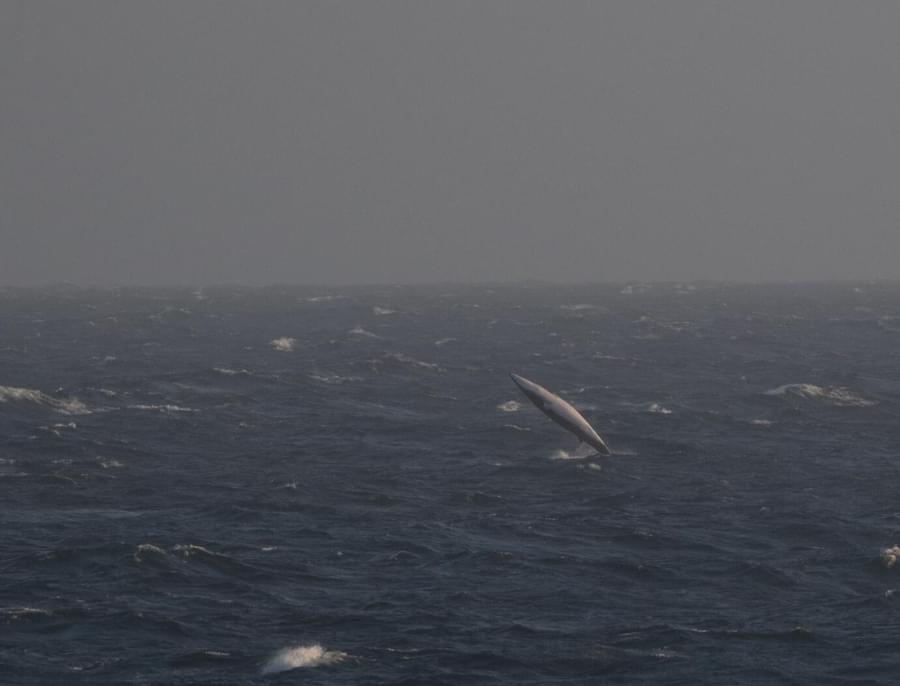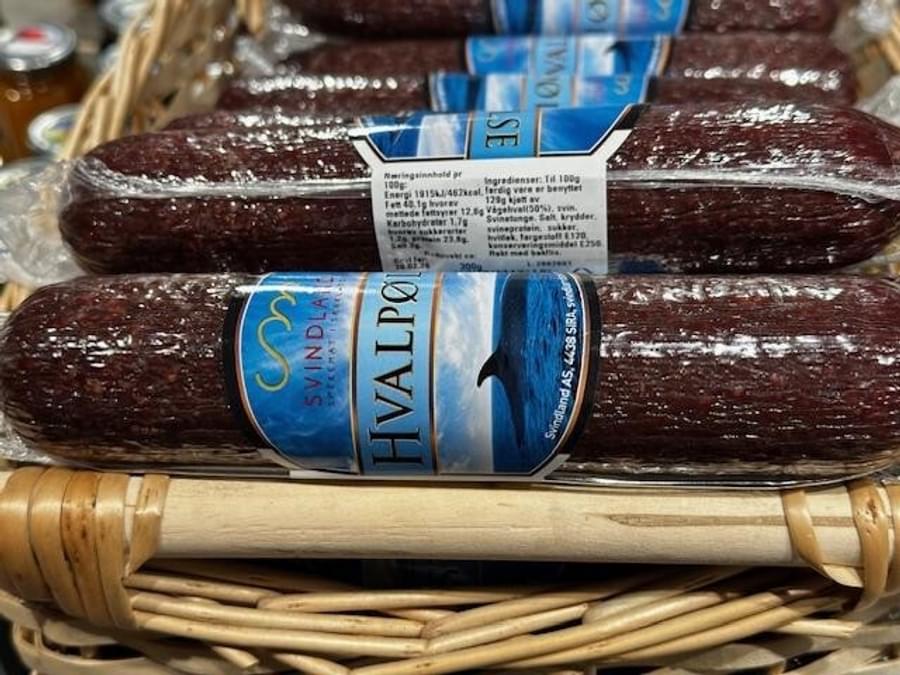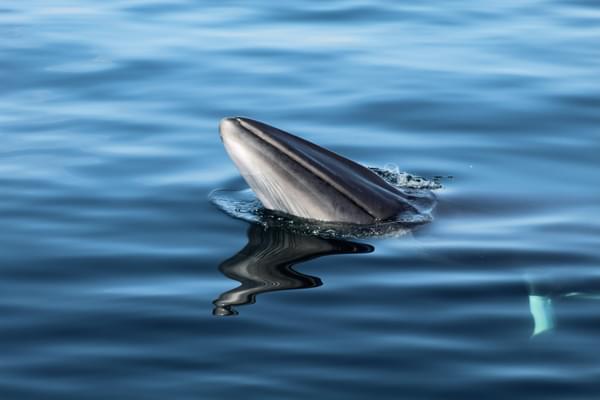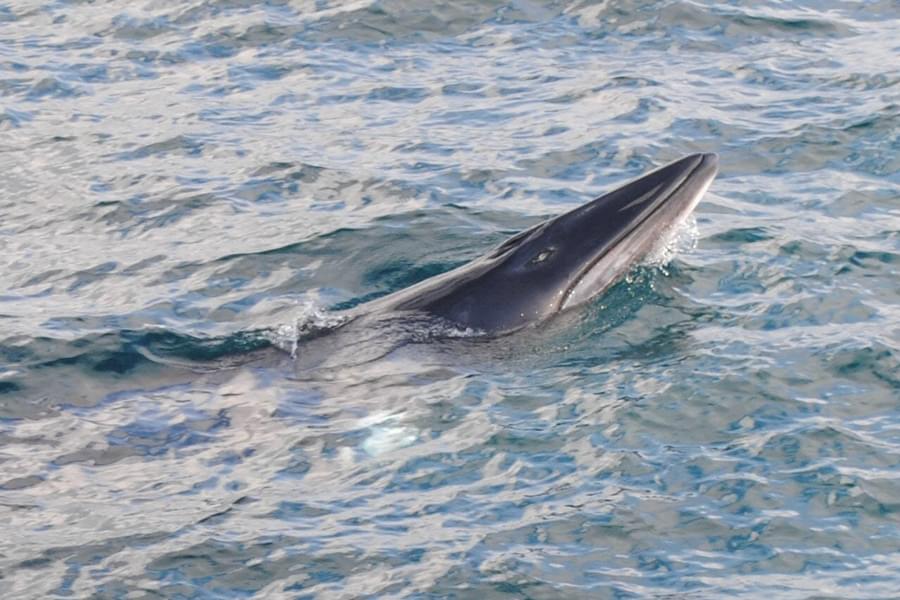Ocean Conservationists, Lindis and Saffron, have recently been onboard Fred.Olsen Cruise Lines Balmoral up to Norway for its Arctic Highlights cruise. Amongst stunning scenery and the midnight sun, they also saw the impact of whaling on tourism.
The sea was rough with plenty of white caps to keep us distracted from looking for cetaceans. Suddenly up ahead, a splash, far too big for a wave. We kept our eyes peeled and suddenly a minke whale breached into the air, landing in a gigantic splash! Wow – how exciting seeing its whole body out of the water! So far on the cruise, the odd minke had been spotted, but as they are very quick on the surface, not many guests saw them. This was the perfect opportunity. We felt very lucky seeing a minke whale wild and free, enjoying the rough Norwegian seas. Sadly, however, it was not only live minke whales we saw on our trip…

In the cold and mostly frozen sections of the supermarkets in the Lofoten islands, there is minke whale meat on sale. It is labelled as ‘hvalbiff’; the meat is very dark in colour. Norway is one of the only countries who still commercially hunt minke whales. Last year, 414 minke whales were hunted, most of them female and more than half of them pregnant. This is clearly not a very sustainable practice.
While they are hunted for food, only 2% of the Norwegian population actually eat whale meat regularly. Efforts to promote it to the general Norwegian public have failed, meaning a lot of the meat is used for dog food, exported to Japan or for tourists.
Advertised as ‘a taste of Norway’, tourism helps keep the industry going. We noticed the sale of minke whale in restaurants aimed at tourists, with whale steaks, whale burgers and whale stew advertised in English on the menu. Minke whale meat was sold, in the form of sausages, right next to the counter in tourist shops, amongst reindeer and moose. It was easily accessible to pick up at the last minute when paying for souvenirs. Ironically, it is actually illegal to bring this back to the UK due to the Convention on International Trade in Endangered Species (CITES).

While Norway’s slogan for whaling is ‘healthy and locally sourced food’, whale meat is in fact bad for your health. With high levels of heavy metals and chemical pollutants, such as mercury and PCBs, regular intake can increase the risk of reproductive issues, cancer and damage immune systems. Most countries advise that pregnant women avoid the meat altogether.
Onboard the ship, we spoke to guests on whaling in Norway, the issues surrounding it and how ORCA are against this cruel, outdated practice. After all, these minke whales are migratory species and Norway can’t claim them as “their” natural resources with any moral or legal legitimacy. A lot is still unknown about their migrations and numbers, so ORCA’s ongoing surveys are highly important in collecting vital population data.
The latest figures from Norway indicate that 345 minke whales have been killed so far this year, with whaling vessels still active. The whaling season started on April 1st, and a quota of 1,406 minke whales has been set for 2025.
Minke whales are sentient beings, and they are not only important for our ocean’s health, but also for our planet’s. As whales defecate on the surface of the water, they act as fertilisers for phytoplankton – the foundation of most food webs and crucial in the global ecosystem. It is our responsibility to protect whales and the great thing is, we can all help! If we avoid buying whale meat and spread the word to others, we can help reduce the demand and hopefully eventually bring this outdated industry to a halt. After all, wouldn’t you prefer to see a minke whale breaching, wild and free, than see it on a shop shelf?

Despite commercial whaling decimating whale populations globally for over a hundred years, there are still countries which think it is acceptable to hunt and kill whales for profit. Our work plays a vital role in helping to put pressure on UK and other governments to drive an end to commercial whaling globally, so please support us at www.orca.org.uk/donate to help us continue this important work

